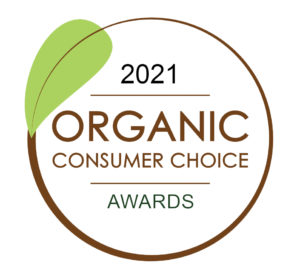Celebrating organics!

It’s National Organic Week (20th-26th September), and what better time to celebrate the many benefits of organic food! Naturopath, Sonya Byron, looks at the myriad ways organic food is better for us and the planet.
The potential human health benefits of an organic diet have been the subject of much debate, due to a scarcity of high quality research studies to date. An increasing body of evidence is indicating that an organic diet has many benefits for human health, however, particularly in regard to pesticide exposure, food safety, and allergic/atopic disease development.
Pesticide exposure

An organic diet reduces your exposure to synthetic pesticides, which may have endocrine-disrupting, neurotoxic, and carcinogenic properties. Reducing pesticide exposure is particularly important for pregnant women and their babies. A 2016 report commissioned by the European Parliament reviewed three long-term birth cohort studies and concluded that pesticide exposure during pregnancy and breastfeeding was associated with negative effects on IQ and neuro-behavioural development in children (1).
Reducing pesticide exposure not only benefits the person eating the food, it also benefits the farmers growing the food. Unintentional, acute pesticide poisoning (UAPP) is a significant and ongoing public health problem globally, with a 2020 systematic review estimating that 385 million cases of UAPP occur each year (affecting 44% of the global farming population), and result in 11,000 fatalities (2).
Food safety
In addition to reduced pesticide exposure, organic farm management practices, such as reduced fertiliser usage and increased soil organic matter content, also result in lower concentrations of some heavy metals, such as cadmium, in crops (3). Restricted antibiotic use in organically farmed animals also has potential public health benefits, as overuse of antibiotics in farm animals has been identified as a key factor in the increasing development of antibiotic resistant bacteria (4). Organic food production also avoids the use of genetically modified organisms (GMOs). Although the potential impact of GMOs on human (and environmental) health is not yet fully understood (5), organic food production promotes food safety by exercising the precautionary principle and omitting these organisms entirely.
Allergic disease development

An organic diet may also reduce your risk of allergic and atopic disease development. The 2006 PARSIFAL epidemiological study of 14000 5-13 year olds living in five European countries demonstrated that children following a biodynamic (organic) diet had a lower prevalence of allergic and atopic symptoms as compared to controls (6).
Benefits for wildlife
Organic farm management practices, compared to conventional farm management practices, enhance and conserve biodiversity, according to a recent meta-analysis of 396 studies (7). Through using traditional and locally adapted seed and livestock breeds and avoiding genetically modified organisms, cultivating a diverse combination of plants and animals and avoiding monocultures, conserving permanent natural vegetation, and reducing or eliminating agrochemical inputs, organic farms create wildlife habitat and encourage a diversity of pollinators, predators, and other wild fauna and flora to thrive.
Benefits for the whole planet!

Organic food also benefits the health of the planet as a whole, particularly our water, soil and the climate.
- Water – Pollution of groundwater with chemical fertilisers and pesticides is a major problem in many agricultural areas of the world (8). Organic agricultural standards prohibit or strictly limit the use of these pollutants and replace them with less polluting alternatives, such as composts and green manures.
- Soil – Organic soil management practices such as minimum tillage, cover cropping and returning crop residues to soil, mulching, crop rotation, and intercropping improve soil formation and stability, and nourish a more diverse population of beneficial soil microorganisms (9). This, in turn, reduces erosion of the soil and enhances its ability to retain water and nutrients, resulting in more productive crop lands and more nutritionally dense food.
- Climate – Organic, regenerative agriculture is increasingly emerging as a powerful tool to help mitigate the climate crisis. By avoiding the use of fossil fuel based agrochemical inputs, organic farming reduces non-renewable resource use. Further, organic soil management practices, such as those mentioned above, are better able to sequester carbon in the soil, with recent studies demonstrating that the carbon content of organically farmed soil is considerably higher than that of conventionally farmed soil (10). According to the UK-based Soil Association, if all of Europe’s farmland were managed according to organic principles, agricultural greenhouse gas emissions would drop by 40-50 per cent by 2050, and there would still be an abundance of food to provide a growing population with a healthy diet (11).
It’s easy to feel overwhelmed by the “big issues” like the climate crisis, and to feel that there’s nothing we can do to create change. But the purchasing decisions we make on a daily basis are a powerful form of action. Every organic purchase we make is effectively a vote, for our health, for the health of our farmers, for our precious wildlife to exist, and for the future of our water, soil and climate. Ultimately, the more people who choose organic, the healthier we’ll all be. If you can’t choose organic on every occasion, and many of us can’t for financial, practical or other reasons, simply do the best you can! Choosing locally produced and seasonal organic produce where possible supports local small scale growers, food security and resilience, and is often more affordable than buying organic produce out of season. Try to grow some of your own organic food too! Even if you don’t have access to a garden, herbs, salad greens, cherry tomatoes and more can be successfully grown in pots, and even sprouts grown on a window sill in your kitchen are a great start.
Vote for the Co-op in the Organic Consumer Choice Awards
National Organic Week Australia (NOW) is a week of targeted media and locally-held activities designed to increase awareness of the benefits of organic products and farming production systems and accelerate the uptake of these in the wider Australian community and environment.

“As consumers, you want food you can recognise and trust. Buying organic products supports food safety, health, good nutrition and the environment. Products that carry the logo of an accredited organic certification body are guaranteed to be genuine organic.” Costa Georgiadis, Ambassador of National Organic Week.
As part of National Organic Week the Co-op has entered the Organic Consumer Choice Awards which recognise outstanding organic brands, products, retailers and more. We’re running for Best Organic Retail Outlet and we need your help to win! Vote for us now.
One of the Co-op’s in store practitioners, Sonya Byron, is a naturopath and yoga teacher in clinical practice at Lower Mountains Health & Healing in Blaxland. Prior to her career in natural health, she earned her living as the owner/farmer of Good Karma Farm, a sustainable two-acre organic farm producing 60 different vegetable and herb crops. She believes that fresh, healthy, home grown food is one of the foundations of good health, and she’s passionate about empowering people to care for their health (and to save money, time and the planet in the process) by learning how to grow and preserve their own food, and how to make their own simple herbal and nutritional remedies for common health complaints. For further information, visit Sonya Byron Plant Medicine at sonyabyron.com.au

(The information in this article is for educational purposes only and is not intended as a substitute for health care advice. Please consult your friendly local naturopath, herbalist or other health care practitioner for personalised advice, particularly if you have a diagnosed medical condition or take pharmaceutical medications).
Photos: Maja Baska Photography & Canva
References
1. EPRS. European Parliamentary Research Service. 2016. Human Health Implications of Organic Food and Organic Agriculture. https://www.europarl.europa.eu/RegData/etudes/STUD/2016/581922/EPRS_STU(2016)581922_EN.pdf
2. Boedeker, W., Watts, M., Clausing, P. & Marquez, E. 2020. The global distribution of acute unintentional pesticide poisoning: estimations based on a systematic review. BMC Public Health 20, 1875
3. The Lancet. (2017). Organic food: panacea for health? 389 (10070), 672.
4. EPRS. European Parliamentary Research Service. 2016. Human Health Implications of Organic Food and Organic Agriculture. https://www.europarl.europa.eu/RegData/etudes/STUD/2016/581922/EPRS_STU(2016)581922_EN.pdf
5. Food and Agriculture Organisation of the United Nations. 2001. Genetically modified organisms, consumers, food safety and the environment. http://www.fao.org/3/X9602E/X9602E00.htm
6. T. Alfvén, C. Braun-Fahrländer, B. Brunekreef, E. von Mutius, J. Riedler, A. Scheynius, M. van Hage, M. Wickman, M. R. Benz, J. Budde, K. B. Michels, D. Schram, E. Üblagger, M. 2006. Allergic diseases and atopic sensitization in children related to farming and anthroposophic lifestyle – the PARSIFAL study. European Journal of Allergy and Clinical Immunology, 61(4), 414-421
7. Rahman, G. (2011) Biodiversity and Organic Farming: What do we know? Agriculture and Forestry Research, 3(61), 189-208.
8. United Nations Food and Agriculture Organisation. (2017). Water Pollution from and to Agriculture. https://wateractiondecade.org/2017/12/09/water-pollution-from-and-to-agriculture/
9. Rodale Institute. (2018). 10 Ways Organic Improves Soil Health. https://rodaleinstitute.org/blog/10-ways-organic-improves-soil-health/
10. Natural Resources Management and Environment Department Food and Agriculture Organization of the United Nations. Organic Agriculture and Carbon Sequestration. Possibilities and constrains for the consideration of organic agriculture within carbon accounting systems. http://www.fao.org/fileadmin/user_upload/rome2007/docs/Organic_Agriculture_and_Carbon_Sequestration.pdf
11. Rivera, L. (2020). Organic September: Could Farming be a Solution to the Climate Crisis? https://www.independent.co.uk/life-style/food-and-drink/features/organic-september-farming-biodiversity-soil-health-environment-damage-a9697721.html



